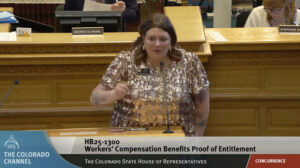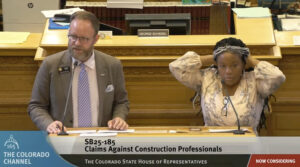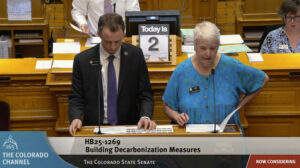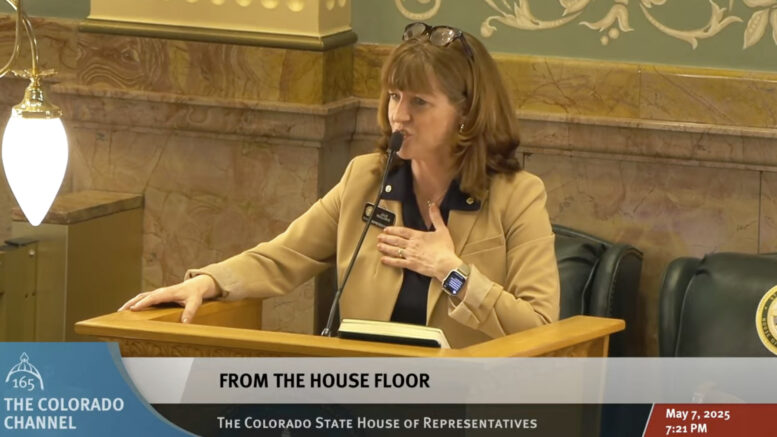Colorado legislators closed the 2025 session with a flurry of activity Wednesday, killing a measure that could have interfered with construction-defects reform, passing several health-care bills and slowing implementation for a proposal to expand injured workers’ doctor choice.
Business leaders will, in the coming days, pore over the full array of actions taken by legislators since Jan. 8 to determine exactly how much the bills that passed and those that were killed will impact their ability to operate successfully in Colorado. But Wednesday’s finale was a microcosm of the full 120-day session, presenting some wins and some losses, as well as decisions that will split the opinions of the state’s job creators.
Here, then, is a look at some of the business-focused highlights of the last day, with some bills omitted from this story because they either have been examined in more depth already (see Wednesday’s wage-theft article) or will be in the next 24 hours. Gov. Jared Polis is now on the clock to sign or veto all the bills that came out of this session by June 6.
Workers’ Comp Shakeup

Colorado state Rep. Jenny Willford discusses her bill Wednesday on workers’ comp doctor choice.
Observers questioned whether House Bill 1300, a bill to expand patients’ choice of doctors in the workers’ compensation system — from four employer-offered options to any accredited provider in a 70-mile range — might be on the ropes as it lingered for four days on the House calendar. Business groups and insurers had already begun preparing a veto campaign, and Gov. Jared Polis reportedly had looked critically on a proposal that opponents warned could add costs and recovery time and costs to a system that, by all accounts, is working well.
But with just hours left in the session, sponsoring Rep. Jenny Willford yanked back the bill after having gotten it a final OK earlier in the day and took it to a conference committee that delayed implementation of the changes by two years, until the start of 2028. Neither Willford nor sponsoring Sen. Cathy Kipp said why they chose to do that, but many observers theorized that such a long runway could give employers and insurers more time to prepare for changes and ease concerns about workers’ comp system chaos.
That last-minute amendment didn’t override a primary concern of opponents — new rules in the bill that would let some patients change doctors up until they reach maximum medical improvement and, thus, delay a return to work. But it intriguingly managed to flip one key vote — that of House Speaker Julie McCluskie, who joined just two other Democrats in her chamber in opposing the bill before the amendment but got behind HB 1300 after the change.
Pinnacol Assurance, the state’s largest workers’ compensation insurer, said it still plans to ask Polis for a veto.
“A costly bill to the economy that delays care for workers remains a costly bill to the economy that delays care for workers – no matter when it’s implemented,” read a statement from the company. “On behalf of our nearly 50,000 members representing both public and private employers across Colorado, we urge Governor Polis to prioritize timely care for workers and affordable premiums today, and well into the future”.
Construction Bill Dies

Colorado state Reps. Matt Soper and Jennifer Bacon explain their Senate Bill 185 to the House.
On the day after HB 1272, a widely supported construction-defects reform bill, finally landed on Polis’ desk, sponsors killed a separate bill that some professionals said could wipe out any gains. Senate Bill 185 got backing from an odd coalition of home builders and attorneys for homeowners — the two interest groups that have been fighting over construction defects for 15 years — and was opposed largely by architects and engineers.
Opponents said the change the bill proposed to make — to let original homeowners sue subcontractors like engineers directly for negligence — could drive insurance costs for those groups through the roof and force professionals out of the residential market. Owners of new-build residences now must sue general contractors, who cover subcontractors under pricey wrap insurance policies and negotiate with each of them the amount of liability they will take on for the job.
The American Council of Engineers of Colorado warned legislators that opening their members to legal action without protection of current law would exile many to commercial development and leave fewer to design the affordable homes HB 1272 seeks to create. Shane McCormick, president at Martin/Martin Consulting Engineers and an ACEC Colorado board member, said that he’s not sure if those efforts killed the bill, but he believes they got legislators thinking differently about a bill that was pitched as protecting homeowners.
“With the construction-defects reform bill going through, part of the message was: ‘You have what many see as a largely helpful bill going through, but this was going to counteract much of it,” McCormick said.
Cosponsoring Rep. Matt Soper, R-Delta, told The Sum & Substance that he wasn’t sure that he could maintain enough votes to pass the bill as opposition to it ramped up in recent weeks and decided it was best to let it go and consider reintroducing SB 185 next year. Without it, though, he said he will watch to see if there is judicial uncertainty — as well as potential uncertainty in the insurance market for general contractors — that impacts Colorado’s effort to boost its attainable housing supply.
Final Healthcare Bills

Colorado state Sens. Matt Ball and Cathy Kipp discuss their building decarbonization bill with the Senate.
Among the bills that passed on the last day of the session was SB 290, which uses a combination of donations and interest earned on the Unclaimed Property Trust Fund to funnel as much as $200 million to safety-net health clinics over the next three years. That late bill was seen as an alternative to a controversial, now-dead proposal that sought to cap payments to hospitals from small-group insurers and the insurance plan for state workers and to use savings to help the struggling clinics that treat uninsured patients.
House members gave final approval too to HB 1094, which would require pharmacy benefit managers to earn income only from flat fees paid by insurers rather than fees determined by the amount of money they save for health insurers by negotiating down drug prices. Though opposed by PBMs and insurers because they argued HB 1094 would gut PBMs’ leverage in negotiating prices, Democrats and rural Republicans backed it as a way to incentivize use of cheaper generic drugs and raise payment levels for rural pharmacies.
On the topic of public-health bills, legislators gave final OK to HB 1269, which extends a timeline for commercial buildings to comply with new emissions-reduction mandates and launches an enterprise through which the Colorado Energy Office will help them meet goals. Many Republicans complained that rather than charge building owners enterprise fees for the state to assist them, they should have just repealed the 2021 law that established the mandates as large downtown buildings struggle with high vacancy rates.
